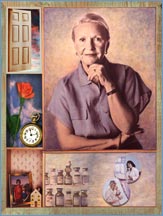
August 2001
Adolescent suicide is one of our countries greatest tragedies. According to the American Association of Suicidology, about every two hours a young person commits suicide. The World Health Organization (WHO) reports that by 2020 depression will be the second leading cause of death and disability worldwide. Parents who recognize their child's mental health problem are to be commended but getting help in the middle of the night can be difficult.
|
Self injury prevented
Yolanda, a 19 year old, became depressed after the death of her aunt. Her parents found a therapist to help her deal with her problems, and she appeared to be progressing.
One Thursday night, she came home and was despondent. She had broken up with her boy friend. Later that evening, she told her parents that she wanted to die and was looking for a knife in the kitchen. Her parents wisely hid everything she could use to hurt herself, including medications.
They put in an emergency call to Yolanda's therapist. The therapist did not call back. They called again and still the call was not returned. Her parents took turns staying up and watching over her so she would not hurt herself.
|
Yolanda's family was right to take her threats seriously, but they had other options in this crisis situation. If they felt they could not protect their daughter, they could have taken her to an emergency room. The emergency room staff would have evaluated her mental status and determined if she needed to be admitted to the hospital. This puts the responsibility of keeping the child safe on the professionals.
We all hope we will not be faced with the crisis Yolanda's family experienced, but we must be realistic and prepare for an emergency. Knowing what to do is key in these situations. Your mental health provider may not be available. It is essential for family members to discuss emergency situations and ask the mental health provider the following:
- What do you consider an emergency?
- What do we do in case of an emergency?
- Are you available for emergencies; if not, whom do we call?
Health Care Answers uses stories of real people trying to
take care of their health. Tell us your story. The stories
we use in our publications are from people like you. The
purpose of these true stories is to help others learn how to
use the medical system more effectively.
Click here if you want to submit a story.
Check back next month for more Personal Stories.
Past Stories 2000
December
Past Stories 2001
January
|
February
|
March
|
April
|
May
|
June
|
July
|
August
|
September
|
October
|
November
|
December
Past Stories 2002
January
|
February
|
March
|
April
|
May
|
Summer
|
September
|
October
|
November
|
December
Past Stories 2003
Winter
|
Spring
|


